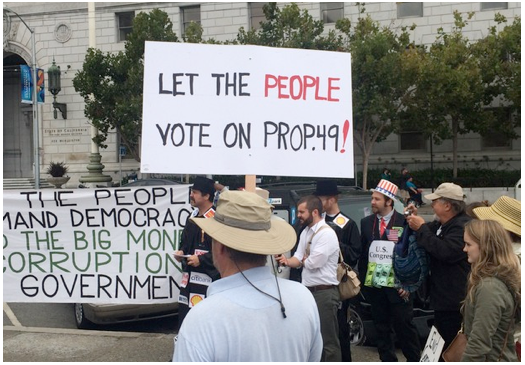CommentsWHO CALLS THE SHOTS-The California State Legislature has filed a petition for rehearing in Howard Jarvis Taxpayers v. Padilla, asking the Court to restore Proposition 49, the Overturn Citizens United Act, to the ballot.
Back in July 2014, the state legislature had enacted Senate Bill 1272, which would place an advisory question on the November ballot to solicit views of California voters on whether to amend the U.S. Constitution to overturn the U.S. Supreme Court decision in Citizens United v. FEC.
Shortly after, the Howard Jarvis Taxpayers Association (HJTA) began a fight to remove the proposition from the 2014 ballot, arguing that the legislature had exceeded its authority. In August of that year, the California Supreme Court ordered the Secretary of State to remove the measure from the ballot, pending full briefing and argument. Justice Goodwin Liu wrote a concurring opinion that advisory measures like Proposition 49 are incompatible with the system of representative democracy.
On January 4 of this year, the CA Supreme Court ruled 6 to 1 in HJTA v. Padilla that the proposition is valid under the California Constitution, reversing the California Supreme Court’s August 2014 decision with the suggestion that the legislature pass a new bill.
According to a September 2015 Bloomberg poll, approximately 80 percent of Americans polled expressed disagreement with the Citizens United ruling. The disapproval was bipartisan with a slightly higher percentage of Democrats than Republicans. Why, then, would the HFTA take steps to remove the proposition from the ballot?
Opposition seems to rest in the advisory nature of the proposition. Advisory propositions are rare. In fact, only three advisory propositions have ever appeared on California ballots. What Prop 49 aimed to do was to allow California voters to instruct Congress and the Legislature to pass and ratify a constitutional amendment to limit campaign spending and establish that only human beings (and not corporations) enjoy constitutional rights.
Should the proposition pass, neither the Congress nor the CA Legislature would be legally bound to follow the lead of California voters, a point that did not rest well with the conservative-leaning HJTA.
Proponents of the proposition, however, are pleased with the latest decision. “The Court didn’t finish the job with its ruling on HJTA v. Padilla,” comments Michele Sutter, Money Out Voters In (MOVI) co-founder, the lead supporter of the Overturn Citizens United Act. “This rehearing will allow them the opportunity to do justice for the 18 million California voters the Court has now disenfranchised twice. Californians have earned the right to vote to overturn Citizens United. If the Court hadn’t intervened to remove the legislature’s perfectly legal ballot measure, something the Court has never done before, we’d have voted on Prop 49 in 2014.”
To date, sixteen states and more than 650 cities and towns across the country have called on their representatives to support such an amendment. In 2012, voters in Montana and Colorado passed similar ballot initiatives by 75 percent. Presidential candidates Hillary Clinton, Sen. Bernie Sanders (I-Vt.) and Sen. Lindsey Graham (R-S.C.,) who suspended his campaign in December, have called for an amendment to overturn the Citizens United decision.
“As presidential candidates race to raise money for their campaign coffers, the need to limit the influence of extremely wealthy and corporate donors in our elections is clearer than ever,” says Emily Rusch, Executive Director of CALPIRG. “At the urging of their constituents, the legislature put Prop 49 on the ballot back in 2014, and we are counting on the legislature to do whatever it takes to hold a vote on the 2016 ballot.”
While Prop 49 (or a similar proposition) is not a legal mandate, the expressed support of voters at the ballot is a strong signal that American citizens are disgruntled with politics as usual and support meaningful campaign finance reform.
“Justice is delayed but it will not be denied. The Legislature can count on an upswell of We the People who will demand that a voter instruction be placed on the 2016 ballot that tells Congress to pass a Constitutional Amendment to overturn Citizens United,” says Kathay Feng, Common Cause CA.
Background on Citizens United v. Federal Election Commission
In a 2010 ruling, the U.S. Supreme Court passed the Citizens United decision 5-4, which ruled that unlimited campaign contributions by corporations were protected under the First Amendment Freedom of Speech clause, thereby rejecting campaign spending limits. Citizens United, a nonprofit corporation, had produced a film about a candidate seeking a party’s nomination in the next Presidential election. Corporations and unions were prohibited by law from funding speech expressly advocating “electioneering communication,” public, cable, or satellite broadcasts made within thirty days of the primary election that clearly identified a candidate for federal office. Citizens United brought the case before the Court to ask for a declaratory judgement so the group would not be subject to civil or criminal penalties for broadcasting their film.
(Beth Cone Kramer is a Los Angeles-based writer and CityWatch contributor.) Edited for CityWatch by Linda Abrams.
-cw
CityWatch
Vol 14 Issue 7
Pub: Jan 22, 2016
Sidebar
Our mission is to promote and facilitate civic engagement and neighborhood empowerment, and to hold area government and its politicians accountable.

 CityWatch Los Angeles
Politics. Perspective. Participation.
CityWatch Los Angeles
Politics. Perspective. Participation.
01
Sun, Mar














